The Intel Core i9-9980XE CPU Review: Refresh Until it Hertz
by Ian Cutress on November 13, 2018 9:00 AM ESTHEDT Performance: Office Tests
The Office test suite is designed to focus around more industry standard tests that focus on office workflows, system meetings, some synthetics, but we also bundle compiler performance in with this section. For users that have to evaluate hardware in general, these are usually the benchmarks that most consider.
All of our benchmark results can also be found in our benchmark engine, Bench.
PCMark 10: Industry Standard System Profiler
Futuremark, now known as UL, has developed benchmarks that have become industry standards for around two decades. The latest complete system test suite is PCMark 10, upgrading over PCMark 8 with updated tests and more OpenCL invested into use cases such as video streaming.
PCMark splits its scores into about 14 different areas, including application startup, web, spreadsheets, photo editing, rendering, video conferencing, and physics. We post all of these numbers in our benchmark database, Bench, however the key metric for the review is the overall score.
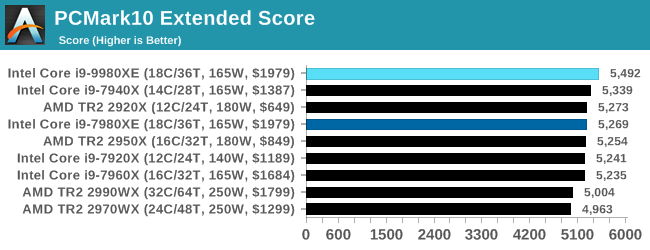
A small bump in the result here because of the added core frequency.
Chromium Compile: Windows VC++ Compile of Chrome 56
A large number of AnandTech readers are software engineers, looking at how the hardware they use performs. While compiling a Linux kernel is ‘standard’ for the reviewers who often compile, our test is a little more varied – we are using the windows instructions to compile Chrome, specifically a Chrome 56 build from March 2017, as that was when we built the test. Google quite handily gives instructions on how to compile with Windows, along with a 400k file download for the repo.
In our test, using Google’s instructions, we use the MSVC compiler and ninja developer tools to manage the compile. As you may expect, the benchmark is variably threaded, with a mix of DRAM requirements that benefit from faster caches. Data procured in our test is the time taken for the compile, which we convert into compiles per day.
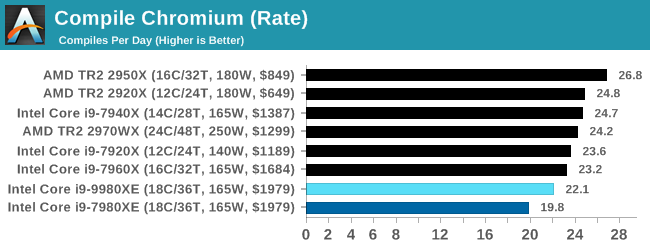
For the compile test, the 9980XE brings the 18-core up to being more competitive, however this test does seem to prefer fewer cores, lower crosstalk, and higher frequencies. AMD's 16-core TR2 wins here, adding 20% perf over the 9980XE for under half the cost.
3DMark Physics: In-Game Physics Compute
Alongside PCMark is 3DMark, Futuremark’s (UL’s) gaming test suite. Each gaming tests consists of one or two GPU heavy scenes, along with a physics test that is indicative of when the test was written and the platform it is aimed at. The main overriding tests, in order of complexity, are Ice Storm, Cloud Gate, Sky Diver, Fire Strike, and Time Spy.
Some of the subtests offer variants, such as Ice Storm Unlimited, which is aimed at mobile platforms with an off-screen rendering, or Fire Strike Ultra which is aimed at high-end 4K systems with lots of the added features turned on. Time Spy also currently has an AVX-512 mode (which we may be using in the future).
For our tests, we report in Bench the results from every physics test, but for the sake of the review we keep it to the most demanding of each scene: Cloud Gate, Sky Diver, Fire Strike Ultra, and Time Spy.
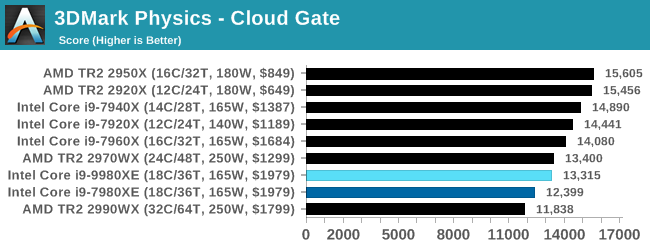
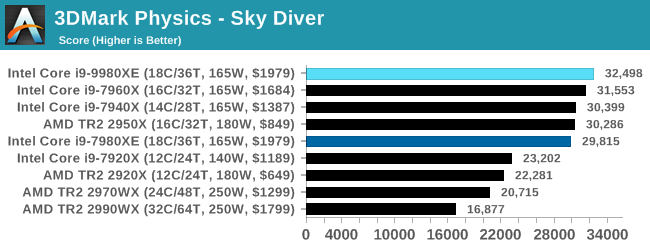
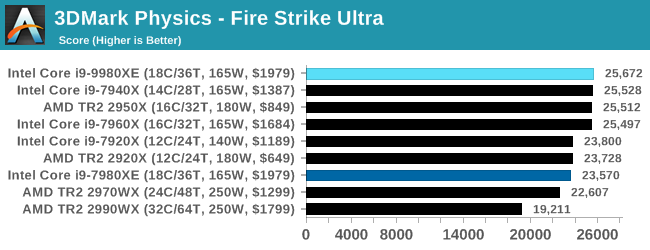
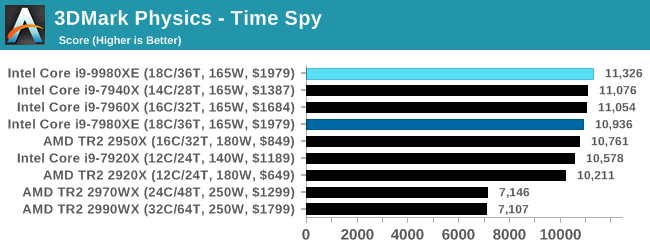
The newer engines can take advantage of the higher core count parts, and Intel's unified memory design also helps here.
GeekBench4: Synthetics
A common tool for cross-platform testing between mobile, PC, and Mac, GeekBench 4 is an ultimate exercise in synthetic testing across a range of algorithms looking for peak throughput. Tests include encryption, compression, fast Fourier transform, memory operations, n-body physics, matrix operations, histogram manipulation, and HTML parsing.
I’m including this test due to popular demand, although the results do come across as overly synthetic, and a lot of users often put a lot of weight behind the test due to the fact that it is compiled across different platforms (although with different compilers).
We record the main subtest scores (Crypto, Integer, Floating Point, Memory) in our benchmark database, but for the review we post the overall single and multi-threaded results.
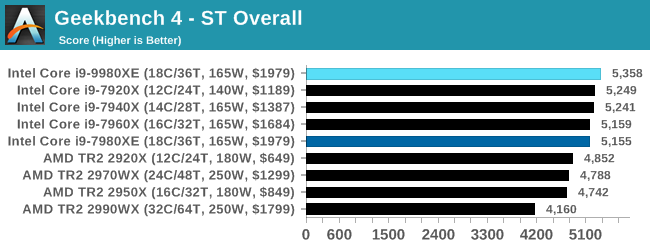
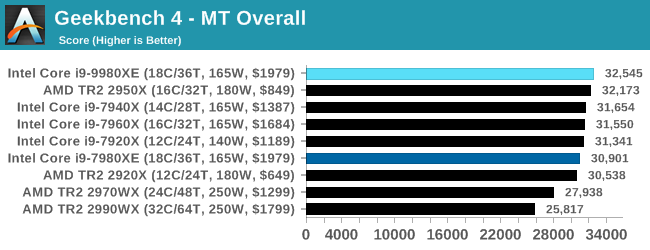










143 Comments
View All Comments
nadim.kahwaji - Tuesday, November 13, 2018 - link
Niceeee , keep up the great work Ian ‘:)AshlayW - Tuesday, November 13, 2018 - link
In my opinion the entire Intel HEDT lineup is a joke. And the 9980XE: $180 more for literally just a bit over *half* the cores and threads. Sure it has better lightly threaded performance but surely that's not the intention of this processor, and surely it is not worth charging this insane 'Intel Tax' premium for it.TEAMSWITCHER - Tuesday, November 13, 2018 - link
Intel is free to charge whatever they want for a device that I have zero intention of purchasing. Most professionals I know have stopped using desktop computers for their daily drivers. The Dell XPS 15 and Apple's 15" MacBook Pro seam to be the weapons of choice these days. These products surely have their uses, but in the real world, most users are happy to sacrifice absolute performance for mobility.imaheadcase - Tuesday, November 13, 2018 - link
Most be a strange world you live on. Mobile won't ever be anything close to a desktop for daily tasks. I don't know any professional who have did that. They use mobile devices mainly to view items they did on desktop, not for working.TEAMSWITCHER - Tuesday, November 13, 2018 - link
Really? I work in software development (WEB, C++, OpenGL, and yes our own ray tracing engine) We have one guy with a desktop, the rest of the developers use either an XPS 15, a MacBook Pro, and one guy with a Surface Book. All were given a choice...this was the result.Interesting story about how we got here... Windows used to be a requirement for developing browser plugins. But with the move to Web Assembly, we can now compile and test our plugin on the Mac just as easily as we do on Windows. While many fanboys will lament this change .. I personally love it!
Endda - Tuesday, November 13, 2018 - link
Yea, for code development only. Mobility has been the choice for that for years.Not everyone is a coder though. Some need these desktops for rendering big animations, videos, etc. You're simply not going to do that in any meaningful way on a laptop
PeachNCream - Tuesday, November 13, 2018 - link
Rendering and production work can indeed happen on laptop hardware. I don't argue that desktop hardware with fewer limits on TDP and storage aren't a faster way to accomplish the same tasks, but as Team noted, given a choice, a lot of people opt for mobility over raw compute power.nerd1 - Tuesday, November 13, 2018 - link
It's a big joke to use XPS or Macbook GPU to do anything intensive. It's good for remote code editing though (except macbooks with absolute terrible keyboard)TEAMSWITCHER - Tuesday, November 13, 2018 - link
Define "intensive." Our software does real-time (WebGL) and photo-realistic (ray-tracing) rendering. I suppose that a Path Tracing engine would be MORE intensive. But the goal of our software is to be as ubiquitous as possible. We support the iPad and some Android tablets.linuxgeex - Wednesday, November 14, 2018 - link
There's your answer: anything that runs on iPad and Android Tablets is not "intensive". I'll grant you that it's "intensive" compared to what we were doing on workstations a decade ago, and mobile is closing the gap... but a workstation today has 24-56 cores (not threads) at 5Ghz and dual NVidia 2080 GPUs. You can get a 12-core CPU and dual 1080 in the pinnacle gaming laptops but they don't have ECC or the certifications of a workstation. At best they have half to 2/3 the performance. If you're paying your engineers by the hour you don't want them sitting on their hands twice as long. But I can see how they might make that choice for themselves. You make an excellent point there, lol.